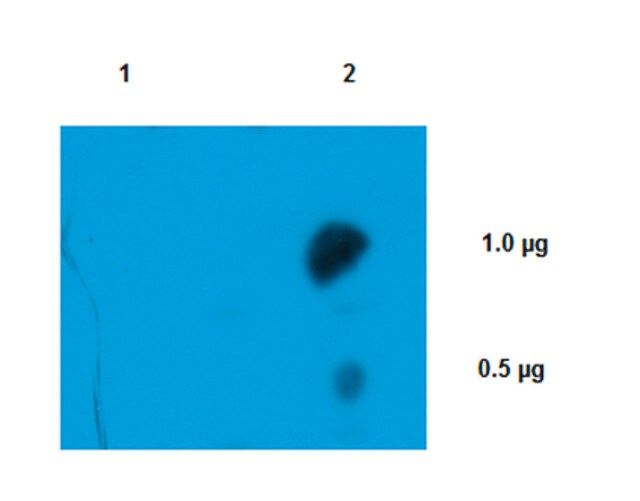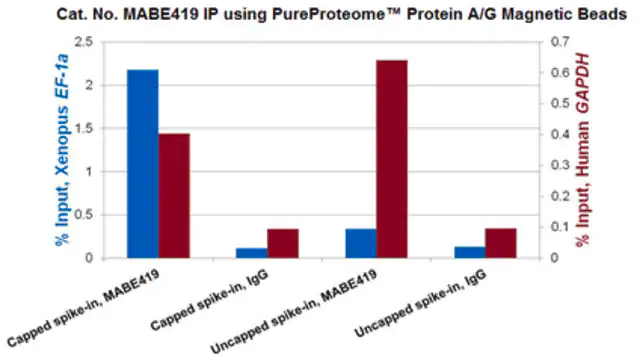您的位置:首页 > 产品中心 > Anti-m3G-cap, m7G-cap Antibody, clone H-20
Anti-m3G-cap, m7G-cap Antibody, clone H-20

基本信息
| eCl@ss | 32160702 |
| NACRES | NA.41 |
| General description【一般描述】 | The nucleotide structure named the 2,2,7-trimethylguanosine(m3G)-containing cap structure of small nuclear ribonucleoprotein particles, or U snRNPs is an essential part of mRNA processing. Each snRNP particle consists of one (U1, U2 and U5) or two (U4/U6) snRNA molecules, a common set of eight core proteins (B, B9, D1, D2, D3, E, F and G, also denoted Sm proteins) that are bound to each of the 2,2,7- trimethylguanosine (m3G) cap-containing snRNAs U1, U2, U4 and U5, and several proteins associated specifically with the individual U snRNPs. Except for U6 snRNP, which does not leave the nucleus, the synthesis of these U snRNPs requires the bidirectional transport of the snRNA across the nuclear envelope. The snRNAs U1, U2, U4 and U5 are synthesized in the nucleus with a 7-monomethylguanosine (m7G) cap structure whereas the Sm proteins are stored in the cytoplasm and do not migrate into the nucleus in the absence of bound U snRNA. Instead, newly transcribed U snRNAs are transiently exported into the cytoplasm where the Sm proteins bind the snRNA’s Sm site, to form a ribonucleoprotein complex referred to as the Sm core. Stable association of all Sm proteins is essential for the hypermethylation of the m7G-cap to the m3G-cap structure. After this event and processing of the snRNAs, the mature snRNP particles are transported back to the nucleus in a receptor-and energy-dependent manner and the complete particle is formed. Monoclonal H-20 recognizes both m3G cap containing snRNPs as well as m7G capped structures and it should have a wide application, not only for studying the molecular biology and immunology of the U snRNPs from diverse organisms, but also for the characterization and isolation of m7G-capped transcripts. |
| Immunogen【免疫原】 | Human m3G-cap and m7G-cap |
| Application【应用】 | Anti-m3G-cap, m7G-cap Antibody, clone H-20 is a mouse monoclonal antibody, validated for use in Dot Blot, IP, western blotting & ICC. Immunoprecipitation Analysis: A representative lot immunoprecipitated m3G-capped and m7G-capped Xenopus EF-1a, which was spiked into 4 µg of HeLa total RNA. Western Blotting Analysis: A representative lot from an independent laboratory detected m3G-cap in m3G-capped snRNAs from HeLa nuclear extracts (Bochnig, P., et al. (1987). Eur J Biochem. 168(2):461-467.). Immunoprecipitation Analysis: A representative lot from an independent laboratory immunoprecipitated m3G-cap from prefractionated HeLa S100 extracts (Huber, J., et al. (1998). EMBO J. 17(14):4114-4126.). Immunocytochemistry Analysis: A representative lot from an independent laboratory detected m3G-cap in m3G-capped U1 snRNPs from digitonin permeabilized HeLa cells (Bochnig, P., et al. (1987). Eur J Biochem. 168(2):461-467.). Research Category Epigenetics & Nuclear Function Research Sub Category Chromatin Biology |
| Quality【质量】 | Evaluated by Dot Blot in in vitro transcribed RNA without and with m7G-cap. Dot Blot Analysis: 1 µg/mL of this antibody detected m7G-cap in in vitro transcribed RNA containing m7G-cap. |
| Physical form【外形】 | Purified mouse monoclonal IgG1κ in buffer containing PBS with 0.05% sodium azide. Format: Purified Protein G Purified |
| Other Notes【其他说明】 | Concentration: Please refer to the Certificate of Analysis for the lot-specific concentration. |
产品性质
| Quality Level【质量水平】 | 100 |
| biological source【生物来源】 | mouse |
| antibody form【抗体形式】 | purified immunoglobulin |
| antibody product type | primary antibodies |
| clone【克隆】 | H-20, monoclonal |
| species reactivity (predicted by homology) | all |
| technique(s) | dot blot: suitable immunocytochemistry: suitable immunoprecipitation (IP): suitable western blot: suitable |
| isotype【同位素/亚型】 | IgG1κ |
| shipped in【运输】 | wet ice |
产品说明
| Storage and Stability【储存及稳定性】 | Stable for 1 year at -20°C from date of receipt. Handling Recommendations: Upon receipt and prior to removing the cap, centrifuge the vial and gently mix the solution. Aliquot into microcentrifuge tubes and store at -20°C. Avoid repeated freeze/thaw cycles, which may damage IgG and affect product performance. |
| Disclaimer【免责声明】 | Unless otherwise stated in our catalog or other company documentation accompanying the product(s), our products are intended for research use only and are not to be used for any other purpose, which includes but is not limited to, unauthorized commercial uses, in vitro diagnostic uses, ex vivo or in vivo therapeutic uses or any type of consumption or application to humans or animals. |
安全信息
| Storage Class Code【储存分类代码】 | 12 - Non Combustible Liquids |
| WGK | WGK 1 |





